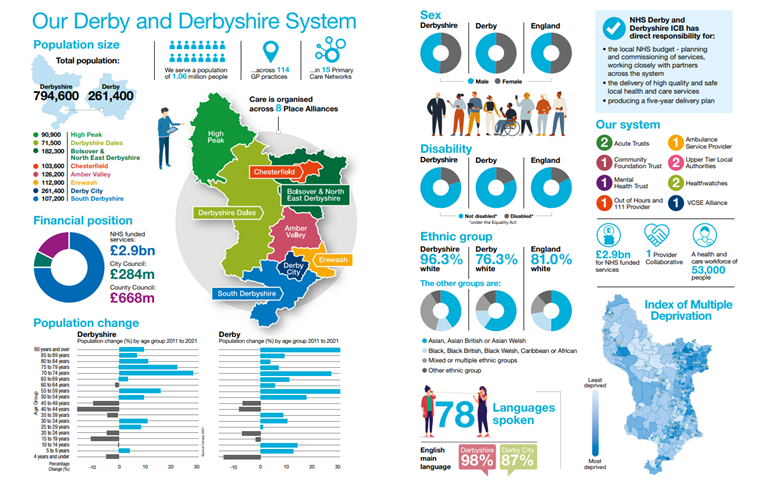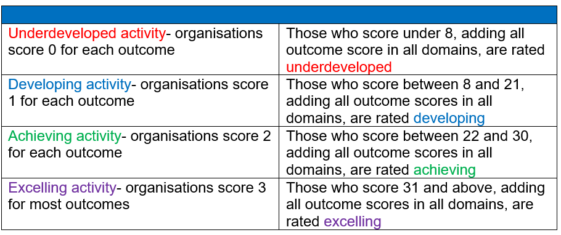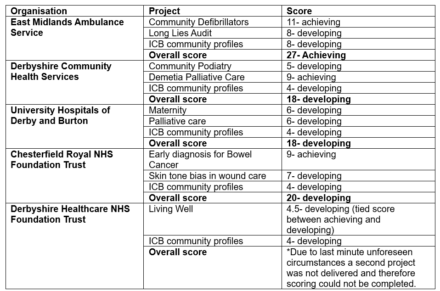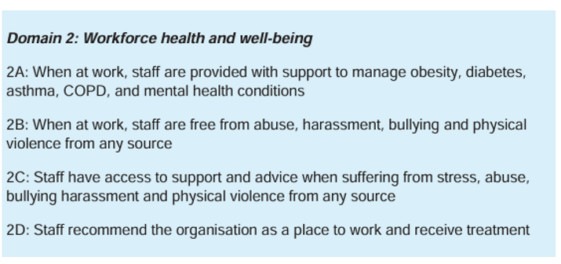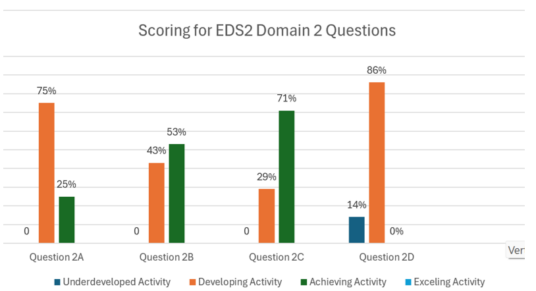Page Contents
Our Derby and Derbyshire
The infographic above is taken from the Joined up Care Derbyshire Derby and Derbyshire Integrated Care Strategy. The purpose of the Derby and Derbyshire Integrated Care Strategy 2023 is to set out how Local Authority, NHS, Healthwatch, and voluntary, community and social enterprise (VCSE) sector organisations will work together to improve the health of Derby and Derbyshire citizens and further the transformative change needed to tackle system-level health and care challenges.
You can find the full document here:
Why do we ask questions about your demographics (background) and what it is used for?
Equality information
To ensure we understand and our communities we need access to data. Information about who uses our services is available from service providers and information about our communities is available from Public Health and other sources. This information helps us to design services and know who is accessing services.
Any information that we access has to comply with our Privacy Notices.
Using information about who uses services
From the information we can access we can work out who is not accessing services as we would expect by comparing expected service level data with community information.
For example, we know that If you’re South Asian, your risk of Type 2 diabetes increases from the age of 25 years. This is much younger than people from other ethnic backgrounds, such as White European where the risk increases from 40 (source: https://www.diabetes.org.uk/node/12895). Therefore, we should expect more younger people from South Asian communities to be accessing services.
Ensuring services meet the requirements of those who need them
In addition to understanding who is using services, we need to make sure we give everyone an opportunity to have their voice heard in feedback on services. By asking for Equality information from people responding to surveys and other engagement work we can use this information to understand where we need to target further engagement work. We can also anonymously understand where things are working well for different protected characteristic groups or need to be improved.
Service change and Equality Impact Assessments
It is important to understand the impact of service changes or developments on those who do and could use services. Part of our service change process is to undertake a Quality and Equality Impact assessment. You can find more information about the process and the tool we use here
Equality Analysis
Having undertaken an Equality Impact assessment this is then used for further work that is called Equality Analysis. This is the act of understanding the information from the Impact assessment and goes beyond just recognising real or perceived inequality. This analysis seeks to understand how inequalities can affect an individual or a group of people. It may need additional and targeted engagement work.
This Equality Analysis is included in a variety of reports and supports our service change decisions.
Equality data about us
Our Workforce
This section provides information on the ICB’s workforce – it provides a snapshot as of 31 March 2024, and includes the overall workforce profile analysis in terms of protected characteristics and information on starters and leavers.
As of 31 March 2024, the ICB employed 493 staff.
The data on the protected characteristics of staff has been drawn from the ICB’s Employee Staff Records. Employee disclosures on Age and Gender have been found to be complete. For the other protected characteristics, the analysis found: 2% did not declare their ethnicity, 9.7% did not declare their disability status, 18.8% did not declare their sexual orientation, 26.2% did not declare their religion or belief and 3.4% did not declare their marital status. The analysis is limited to that extent and does not reflect a full picture of its workforce.
Over the coming months, we will proactively work to encourage staff to feel confident in updating their personal information as part of our efforts toward creating an inclusive organisation and building a more accurate workforce profile. The data will continue to be updated periodically.
Race Equality Standard
Implementing the Workforce Race Equality Standard (WRES) is a requirement for NHS commissioners and NHS healthcare providers including independent organisations, through the NHS standard contract.
The NHS Equality and Diversity Council announced on 31 July 2014 that it had agreed action to ensure employees from black and minority ethnic (BME) backgrounds have equal access to career opportunities and receive fair treatment in the workplace.
This is important because studies shows that a motivated, included and valued workforce helps deliver high quality patient care, increased patient satisfaction and better patient safety.
88.2% of the ICB’s workforce identified as White, 6.7% as Asian, 2% as Black, 0.6% as Mixed, 0.4% as Chinese and 2% did not state their ethnicity.
In the 2021 Census of the people in Derby 75.3% identified their ethnic group within the ‘White’ category (a decrease from 80.3% in 2011). In Derbyshire this number is 95.8%.
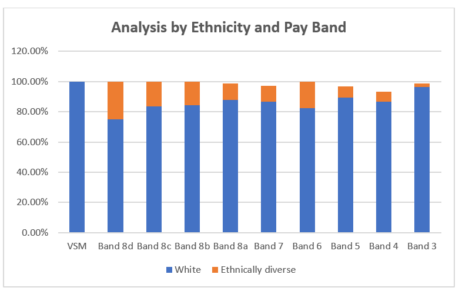
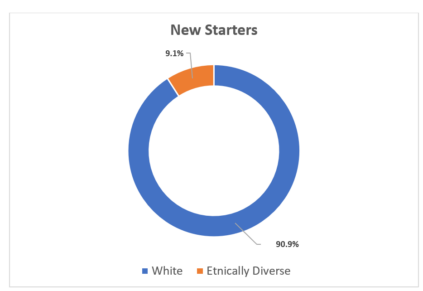
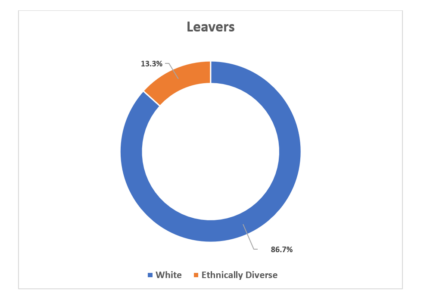
The 2023 staff survey identified that our ethnically diverse staff feel less satisfied with the level of pay, and less satisfied that the organisation acts fairly regarding career progression.
The ICB recruitment data also shows that our ethnically diverse candidates are less likely to be successful during the recruitment process.
The ICB has agreed the following action to address this:
- Overhaul recruitment and selection processes
- All recruiting managers to undertake Fair & inclusive recruitment and unconscious bias training
- Board members to actively participate in the Building Leadership for Inclusion development programme
- Co-produce an Anti-Racism Strategy
- A wider roll out of reciprocal mentoring
- Leadership and Management development (to include being a kind, compassionate and inclusive manager with a focus on wellbeing)
The ICB will work with the Diversity and Inclusion Network to implement the above.
Workforce Disability Equality Standard
The Workforce Disability Equality Standard (WDES) is a set of ten specific measures (metrics) which enables NHS organisations to compare the workplace and career experiences of disabled and non-disabled staff. NHS organisations use the metrics data to develop and publish an action plan, building on high impact actions shared in the first ever EDI improvement plan. Year on year comparison enables NHS organisations to demonstrate progress against the indicators of disability equality to create the cultures of belonging and trust that will improve retention, recruit from the widest possible talent pool and provide sustainable careers.
Making a difference for disabled staff
The WDES is important, because research shows that a motivated, included and valued workforce helps to deliver high quality patient care, increased patient satisfaction and improved patient safety.
The WDES puts data into the hands of people in NHS organisations who best understand the experiences of their disabled staff and how to make positive change. A more inclusive environment for disabled people working and seeking employment in the NHS is better for our people, for teams and for patients.
- 7% of the ICB’s workforce declared they had a disability
- 9% stated they did not have a disability
- 4% did not declare their disability
- 2% preferred not to state if they had a disability
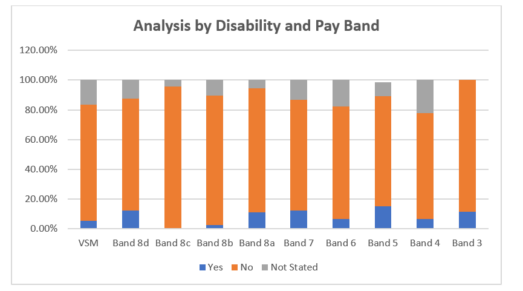
New Starters
81.8% of new starters did not have a disability, 4.5% did not specify and 13.5% declared having a disability.
Leavers
83.3% of leavers did not have a disability, 6.7% did not specify and 10% had a disability.
The ICB is a Disability Confident Employer and has a Disability and Reasonable Adjustment Policy. In the 2023 Staff Survey 89.3% of disabled staff stated that the ICB had made reasonable adjustment(s) to enable them to carry out their work.
The ICB is committed to ensuring all disabled staff have the reasonable adjustments they need at work.
Gender pay gap
Organisations with 250 or more employees are mandated by the government to report annually on their gender pay gap. The requirements of the mandate within the Equality Act 2010 (Gender Pay Gap Information) Regulations 2017 are to publish information relating to pay for six specific measures, as detailed in this report.
The intention of the pay gap reporting is to focus organisational attention on taking action to reduce those inequalities, bringing to life our commitments from the People Promise and focus effort on improving staff experiences within our workplace, improving retention and making the NHS the best place to work. Evidence indicates that disparity in pay has a lasting socioeconomic impact on staff.
The ICB has 493 staff. Of the 493 84.2% identified as female and 15.8% identified as male. The majority of female staff were employed within the lower pay bands within the ICB.
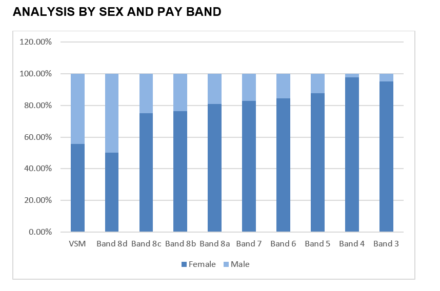
55.6% of the staff in Very Senior Manager Very Senior Manager (‘VSM’) pay bands, which are executive director or director positions were female.
90% of males and 97% of females are on NHS Agenda for Change terms and conditions.
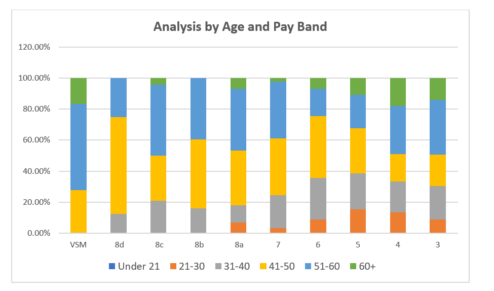
Sexual orientation
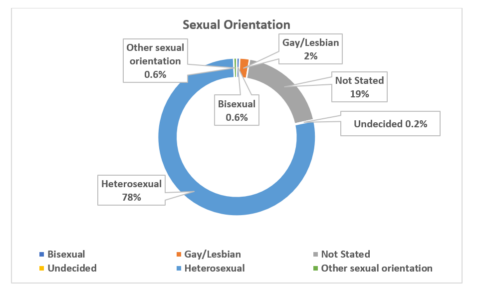
The Public Sector Equality Duty
The public sector equality duty consists of a general equality duty, which is set out in section 149 of the Equality Act 2010. This general equality duty came into force on 5 April 2011.
In summary, those subject to the equality duty must, in the exercise of their functions, have due regard to the need to:
- Eliminate unlawful discrimination, harassment and victimisation and other conduct prohibited by the Act
- Advance equality of opportunity between people who share a protected characteristic and those who do not
- Foster good relations between people who share a protected characteristic and those who do not
The Act helpfully explains that having due regard for advancing equality involves:
- Removing or minimising disadvantages suffered by people due to their protected characteristics
- Taking steps to meet the needs of people from protected groups where these are different from the needs of other people
- Encouraging people from protected groups to participate in public life or in other activities where their participation is disproportionately low
Due regard (Equality Analysis) is an ongoing proactive process which requires the use of information about the effect our decisions are likely to have on local communities, service users and employees, particularly those who are most vulnerable or at risk or disadvantage.
The duty covers the following nine protected characteristics for public sector organisations:
- Age
- Disability
- Gender Reassignment
- Pregnancy and Maternity
- Race
- Religion or Belief
- Sex
- Sexual Orientation
- Marriage or Civil Partnership
Whilst they are not a recognised as a legal protected characteristic, the needs of the Armed Forces and Veterans as well as those identified as having a level of social deprivation (these factors include mental illness, poverty, poor education and low socioeconomic status) should be considered.
Derby and Derbyshire Integrated Care Board is committed to meeting the Public Sector Equality Duty and will do this in a number of ways including:
- Ensuring all staff understand their duties around Equality and this will be included in all staff job descriptions
- Reporting progress through the EDS2 (now EDS2022) template every year
- Developing Equality Objectives and reporting progress against delivery
- Ensuring that Equality is considered at every decision making committee through robust cover sheets ensuring that the considerations are highlighted
- Ensuring Due Regard is taken in all decision making through an Equality Impact Assessment
- Supporting staff to understand Equality and how to complete an EIA through one to one and group discussion sessions
- Linking Equality and Quality impacts through a joint panel approval process
- Ensuring all decisions include a reasonable adjustment statement as there is an understanding that there are always exceptions
As an authorised public sector organisation we are required by the Equality Act 2010 and Human Rights Act 1998 to work in ways that ensure equality and inclusion is embedded into all of our functions.
It is the intention of the Integrated Care Board to eliminate unfair and unlawful discriminatory practices in line with current equality and Human Rights legislation.
There are a number of duties which the Integrated Care Board must address:
Specific Duties
The Integrated Care Board must prepare and publish one or more equality objectives it thinks it should achieve to support the Public Sector Equality Duty (detailed above). The objectives must be published not later than 31 March and at intervals of not greater than four years. Each objective must be specific and measurable.
The Integrated Care Board must publish information, not later than 28 February each year, to demonstrate compliance with the Public Sector Equality Duty which is done through the EDS2022 template. The information published must relate to persons who share a relevant protected characteristic who are:
- Its employees (only when employing 150 people or more)
- Other persons affected by its policies and practices
Publication of Information
NHS Derby and Derbyshire Integrated Care Board became an authorised public sector organisation on 1 July 2022, in line with the reorganisation of the NHS brought about by the Health and Social Care Act 2022.
The level of detail to the information that is currently available to demonstrate how the Integrated Care Board is complying with the Public Sector Equality Duty (PSED) continues to be improved.
In meeting the duty to publish information the Integrated Care Board has collected the following evidence which should provide an understanding of how the CCG is approaching equality and inclusion in its activities.
Public Sector Equality Duty report 2023-24
As the first Public Sector Equality Duty report of NHS Derby and Derbyshire Integrated Care Board (DDICB) since it was formally established on July 1st 2022, this report sets out how DDICB has and will show due regard to its equality duties with respect to patients/service users and staff.
It highlights arrangements currently being made within the ICB, collaborations underway with partners and key levers being adopted to mainstream equality, diversity and inclusion as an employer, commissioner of services and facilitator of partnerships.
The scope of the report focuses on the ICB as an employer and includes a section on its role in levelling up performance on workforce priorities across the ICS partners, including Trusts and Local authorities. For the work on health inequalities, the report details arrangements made through the standard conditions of contracts with providers and health inequality plans as a commissioner and collaborator of partnerships.
Equality Objectives
As part of illustrating meeting the Public Sector Equality Duty the Integrated Care Board sets and reports on Equality Objectives. Further information can be found in the Derby and Derbyshire ICB Equality objectives 24- 25
The Integrated Care Board has worked with system partners in implementing the NHS EDS2022 reporting framework to support it in meeting the requirements of the PSED.
The Equality Delivery System (EDS)
Equality Delivery System (EDS) 2023-2024
EDS is a system that helps NHS organisations improve the services they provide for their local communities and provide better working environments, free of discrimination, for those who work in the NHS, while meeting the requirements of the Equality Act 2010. The EDS was developed by the NHS, for the NHS, taking inspiration from existing work and good practice. It was launched in 2011 with an updated version (EDS2 launched in 2013)
Background to the EDS
The EDS was first launched for the NHS in November 2011. In November 2012, Shared Intelligence published their report ‘’ which looked at how the EDS had been adopted across NHS organisations. Based on this evaluation and subsequent engagement with the NHS and key stakeholders, a refreshed EDS – – was made available in November 2013.
A review of the EDS2 was undertaken to incorporate system changes and take account of the new system architecture for Integrated Care Systems. Through collaboration and co-production and taking into account the impact of COVID-19, the EDS has been updated and EDS 2022 was live tested during 2022/23.
The main purpose of the EDS was, and remains, to help local NHS systems and organisations, in discussion with local partners and local populations, review and improve their performance for people with characteristics protected by the Equality Act 2010. By using the EDS 2022, NHS organisations can also be helped to deliver on the Public Sector Equality Duty.
EDS 2022 is aligned to NHS England’s and its commitment to an inclusive NHS that is fair and accessible to all.
The Derby and Derbyshire approach to Domain 1
Having reflected on the process undertaken in 23-24 it was felt that one session was too intense for those attending and rushed for the presenters. It was agreed that having shorter organisational specific sessions, supported by the ICB, would be much better. This would allow each project to have enough time to showcase their work and be much more interactive with those attending the sessions.
As per last year it was agreed that each Provider would present two projects and there would be one ICB project that supported people across the Derby and Derbyshire area.
East Midlands Ambulance Service– scoring event 17th January showcasing Community Defibrillators and project on Long Lies which was auditing the outcome of people who have waited a long time for an ambulance.
Derbyshire Community Health services Foundation Trust– scoring event on 4th February showcasing Community Podiatry and Dementia Palliative Care
University Hospitals of Derby and Burton NHS Foundation Trust– scoring events on 14th February and 26th February showcasing Maternity and Palliative medicine. Due to clinician availability two sessions were set up.
Chesterfield Royal Hospital NHS Foundation Trust- 26th February showcasing work on Early Diagnosis for Bowel Cancer (supporting people with Learning Disabilities) and Addressing skin tone bias in wound care
Derbyshire Healthcare NHS Foundation Trust– 27th February showcasing work around Living Well
Area 3- It was agreed that the recent work around the development of Community profiles to support communication and engagement work would be presented by the ICB to illustrate how the team are looking to work differently to really meet the needs of local communities.
Scoring
The ICB sent out invitations to local community groups and each provider sent invitations to their own patient and public involvement groups.
There are 4 statements that need to be considered in the scoring of the presented projects. These are:
After the scoring events, the scoring for each presentation from Providers and also for Joined up Care Derbyshire was added together giving an overall score for each Provider and the Joined up Care Derbyshire System.
The scoring will be on a scale of 0-3
The scores for each question are then added up and an overall score for each Provider and the ICS are calculated based on the criteria below:
Scores
Each provider had their projects scored and these were added to the ICB’s presentation score and this achieved an overall score from each event based on a majority of scores given at each scoring event.
Each Provider holds organisational action plans to progress delivery of projects presented.
The ICB has set Community Profiles as an organisational objective from 2024-2026 and will update progress at the end of March 2025.
For further information, including the presentations used at the scoring events, please contact Claire.Warner18@nhs.net
EDS Domain 2 scoring
The Integrated Care Board (ICB) Chief People Officer and Assistant Director of Human Resources and Organisational Development led an engagement event with colleagues from all directorates on 13th February 2025.
Representatives from all directorates, with a broad range of protected characteristics as specified in the EDS2 guidance’ were invited to attend the event. A total of 8 colleagues attended the event.
A presentation was given on how the ICB has enabled and embedded services to support our ICB workforce in relation to health and well-being activities and initiatives against the EDS2 Domain 2 standards.
Colleagues were asked to score on how mature they thought that these services were embedded and effective with the ICB using the nationally prescribed scoring system.
Questions asked were
Scores were
A full report including rationales can be found below:
Summary and next steps
The scores from this engagement process have fed into the ICB’s overall EDS2 rating which legally has to be published on the ICBs public website by 28th February.
The feedback will be used to create an action plan which will align to the wider ICB Organisation Development plan aimed at creating an inclusive and compassionate culture and making the ICB an even better place to work.
The development of the action plan will be supported by the ICB Diversity and Inclusion Network and Organisational Effectiveness and Improvement Group with regular updates to the Executive Team.

